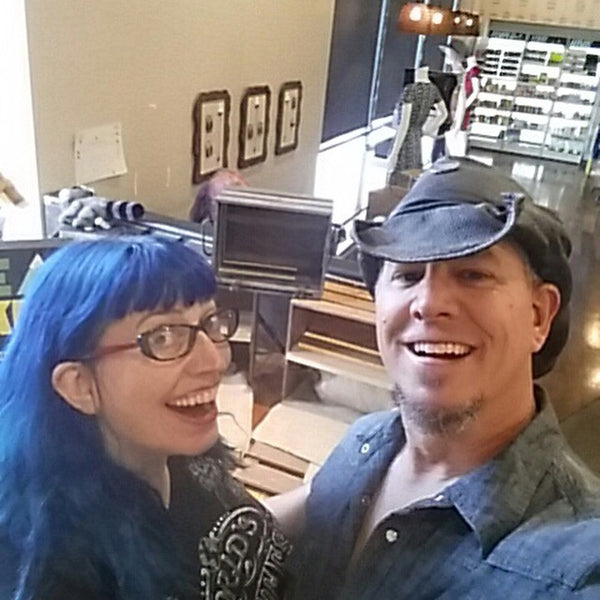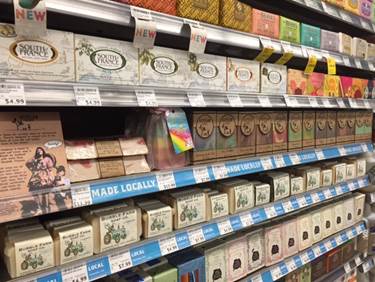 What's the deal with Whole Foods?
What's the deal with Whole Foods?
Are they good? Evil? Price-gouging? Flaky? Supportive of artisans?
Everyone has an opinion about Whole Foods, and I think this is a testament to their success as a company.
Whole Foods created a market niche unfilled by any other company (as far as I can tell)
I personally love Whole Foods and did even before they became our customer.
Why? Because unlike most "grocery" stores, their products focus on quality. The eggs are fresh, the vegetables are good, and even their frozen food aisle is filled with nutritious and easy meals.
It doesn't feel like I'm shopping from a factory.
But unlike Farmer's Markets or many other natural food stores, things in Whole Foods feel "buttoned up." Just because it's not in a factory doesn't mean it's not appealing or orderly. Things have been selected with care, and the things they have selected, for the most part, are good. They don't have ripped labels and they aren't on displays that are creased or falling over. Everything looks NICE.
And we can be reasonably assured that the products are manufactured in ethical ways using sustainable practices.
As a vendor, I personally have to sign an affirmation that we will never be unethical or engage in unfair trade. I have to also either provide proof of workers compensation insurance, or, in our case (since we have no employees), file for an exemption.
Of course, all this comes at a price.
In our culture, we are in a position of comparing the price of something with an unrealistic view of the cost of something.
I don't have to explain this to you... you're reading the blog of an independent maker who has been very transparent about our costs and business practices. But for clarity's sake...
Costs include everything from the ingredients to the labor to the overhead.
It's no secret that if you're looking at two "identical" items on the shelf, and one is marked at $3 and the other is marked at $8, you're likely going to pick the one for $3. It just makes sense.
 We talk ourselves into believing that picking the $3 item is the responsible thing to do, since it protects our finances.
We talk ourselves into believing that picking the $3 item is the responsible thing to do, since it protects our finances.
And in places stores like Safeway or Lucky, it is easy to make that decision because the product is removed from the manufacturing process.
But in Whole Foods, you're standing there looking at a shelf of products, and the $3 item is made in a factory in Chicago using ingredients from who-knows-where, paying people $300/week (which means they get to decide between rent and food at the end of the month), but the $8 item is made by a mom and pop operation where every dollar counts, the ingredients are high quality, and the labor is one of love, this becomes a more complicated issue.
On one hand, getting a $3 item means you have $5 more to spend on, say, a better piece of cheese, or to save for the inevitable pet bills when Agent Fluffypants gets older, or to put toward your daughter's college education, or to add to your Canon-DSLR-camera-so-I-can-be-a-professional-travel-photographer-and-live-the-life-I-always-dreamed fund.
Christ. You probably should put it toward the DSLR fund, because that sounds amazing.
But on the other hand, it's just $5. You were probably going to spend many times that going out for happy hour. And the money means the world to the small business, but won't even be noticed by the massive manufacturers. And the $8 item is unarguably higher quality. So... what's $5?
It comes down to perceived value
Some people think this means "cheap," but I think it means "high benefit per dollar."
For example, I think an $8 pound of Tillamook cheese has a higher value than a $3 pound of Kraft cheese.
No matter how broke we are, we will not buy Kraft cheese because I consider it inedible. It has zero value to me.
On the other hand, I find Tillamook cheese delicious and I even visited their factory. Tillamook cheese has a very high value both because it is useful (as food) and has happy memories associated with it. If I have money to buy cheese, I will buy Tillamook.
Whole Foods buys what their customers feel has value.
In an effort to streamline operations, Whole Foods is consolidating their purchasing decisions to regional buyers. At the same time, they are focusing on more "value" brands.
Because of this, Outlaw Soaps is at an interesting crossroads.
At the end of the day, it's about what you, the customer, wants.
Almost no brands have customers passionate enough to ask about products, but we do.
Do you know how many people go in and ask for specific products in stores? ALMOST NONE. It's like voting... people assume that their voice isn't meaningful, but it truly is, just because everyone assumes their voice isn't meaningful.
Your voice is INTENSELY MEANINGFUL.
Just by going in and asking for Outlaws, you build awareness of our business, you plant the seeds of "this company has value" in the minds of buyers, and you can dramatically shift the course of our business.
RIGHT NOW, because of the changing direction of Whole Foods' purchasing strategy, your voice can make a difference.
You don't have to do anything fancy like bringing a catalog or samples or anything -- people vastly underestimate the importance of just asking.
In fact, we delivered a huge order to the Autry Museum in Los Angeles (a post on that tomorrow) entirely because two of our friends and customers asked for our products. That order made up about half our wholesale sales for this month. It really does make a difference.
As always, both Russ and I are deeply grateful for the support you have given us as people and as a company.
More on our FOUR YEAR ANNIVERSARY of business in a couple days, but briefly, we could not do this without your support. You have no idea how much it means to us to have you by our side.
Thank you.
To find out how to ask for Outlaws, I made a page about it right here.
 What's the deal with Whole Foods?
What's the deal with Whole Foods?


